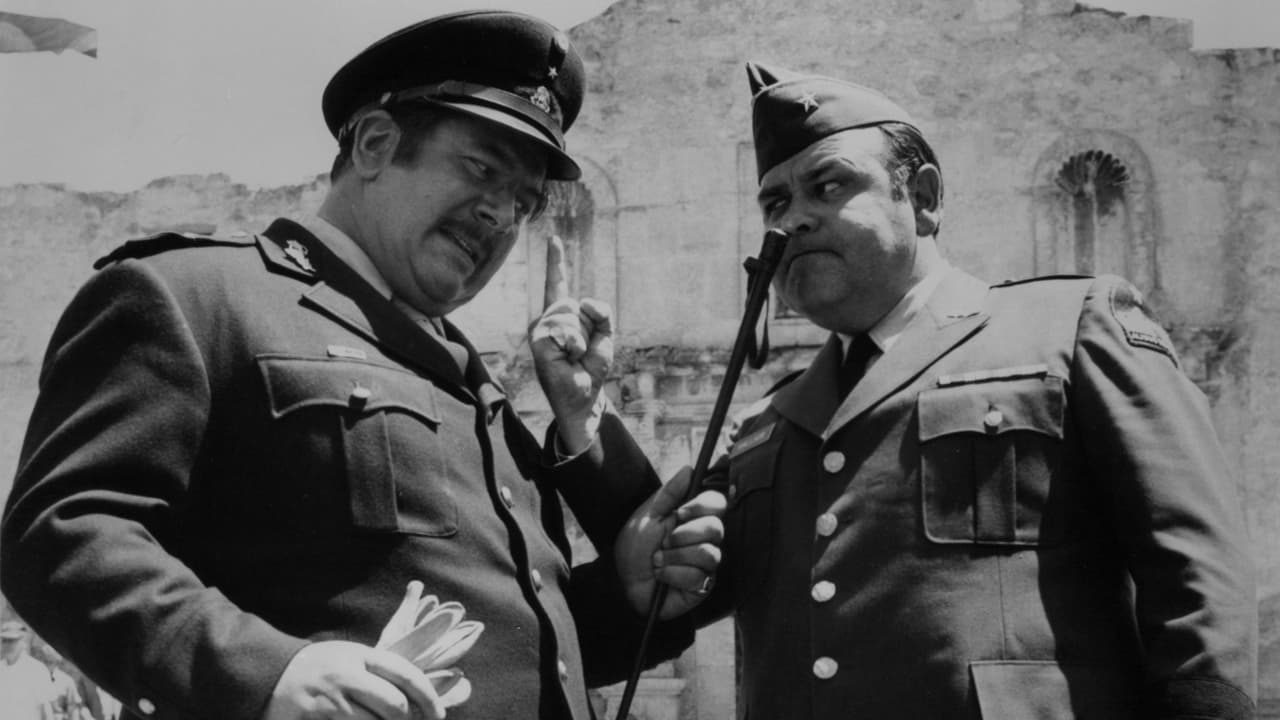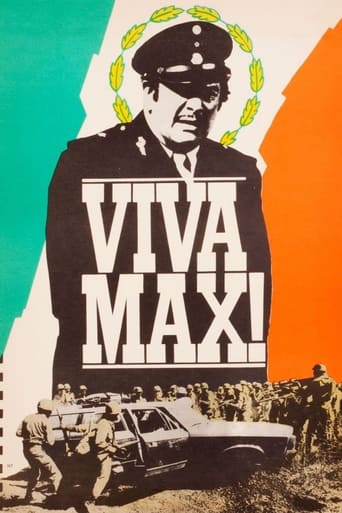

Good concept, poorly executed.
... View MoreThis movie tries so hard to be funny, yet it falls flat every time. Just another example of recycled ideas repackaged with women in an attempt to appeal to a certain audience.
... View MoreClose shines in drama with strong language, adult themes.
... View MoreBlistering performances.
... View More"Viva Max!" is a satirical comedy about what might happen if the Mexicans attempted to retake the Alamo. Following the battle in 1836, the Alamo has become an icon of American patriotism, even though the battle was technically a Mexican victory and even though the defenders were not fighting for the United States but for the long-defunct Republic of Texas. The standard patriotic version of the events of 1836 is narrated in the John Wayne epic from 1960, a film referred to several times in "Viva Max!" The Mexicans, of course, also have their own patriotic take on these events, seeing themselves as gallantly resisting U.S. aggression and conveniently forgetting that it was the dictatorial high-handedness of their government which provoked the War of Texan Independence and the incompetence of that government which led to them losing it.The "hero" of the film is General Maximilian Rodriguez de Santos, a Mexican officer who is inspired to mount his invasion not by patriotism but by the desire to impress his mistress, who has taunted him that his men would not even follow him into a brothel. Despite his elevated rank, the General only has a single platoon of soldiers under his command, but this proves to be sufficient. They bluff their way past the American border guards, catch a bus into the centre of San Antonio and then storm into the Alamo just before closing time, capturing it without needing to fire a shot. (Which is just as well, as they have forgotten to bring any ammunition with them).The film's star, Peter Ustinov, does not appear to have had a very high opinion of it; in his witty and entertaining autobiography "Dear Me" he dismisses it in a single sentence. He does, however, find room to tell us that it was banned in Mexico. The Mexican authorities presumably took exception to the depiction of their army as an incompetent, cowardly, ill-disciplined rabble led by buffoons like General Max. It was fortunate for the film-makers that the American constitution guarantees free speech, including the right to lampoon national institutions, otherwise the film might also have been banned north of the Rio Grande.Certainly, the Americans in this film are satirised just as mercilessly as their Mexican counterparts. The National Guard general tasked with retaking the Alamo is more concerned with his furniture business than with warfare and is reluctant to order an attack for fear of alienating his customers (most of whom are Mexican-Americans). There is also a regular general who proves no more competent, a State Department official whose patronising attitude to the Mexicans prevents a peaceful resolution to the standoff and a right-wing militia who believe that Max and his men are part of a gigantic Chinese Communist conspiracy to take over America. The political left are also satirised in the person of Paula, the glamorous radical-chic student who manages to persuade herself that Max is a heroic Marxist revolutionary in the Che Guevara mould.Although the Academy unaccountably awarded him an Oscar for his role in "Spartacus", I have always thought that Ustinov's talents lay more in the field of comedy than of serious drama. Some have taken exception to his performance in this film, largely on the grounds that they consider it politically incorrect for an actor to portray a character of an ethnicity different to his own, but given that Ustinov was the son of a Russian mother and a German father of Russian extraction, also had French, Italian, Ethiopian and Polish ancestry, held a British passport and lived in Switzerland it would be difficult to define precisely what his own ethnicity was. His varied background made him a master of different accents, a skill he puts to good use here. His Max is a brilliant comic creation, a satire on the military mind, and yet at the same time a human being who manages, for all his flaws, to retain a certain amount of sympathy.Not all the satire really works, although Ustinov receives some good support from Jonathan Winters as the furniture-dealing General Hallson, John Astin as the bullying Sergeant Valdez and Kenneth Mars as the militia leader who finds out too late that his men would rather talk tough about Communism than fight it. Perhaps the greatest tribute to the film was paid by those Texans who staged protests against the movie, stopping filming taking place in the Alamo itself, which they regarded as a "sacred shrine". They evidently didn't realise that it was this sort of jingoistic pomposity that the film was sending up. 6/10
... View MoreSophisticated cosmopolite Peter Ustinov blots his copybook here with a caricature of a performance "browned up" as the eponymous "Max",a Mexican army officer unbelicose by nature who recaptures The Alamo to impress his girlfriend.Now clearly this episode of American history is a sensitive area to many,but is rather too domestic for us Europeans to understand the subtle nuances involved.Pride on both sides of the border is easily ruffled so General Max may well have had at least the tacit support of many of his fellow Mexicans.Where I feel they may have not been so happy is with the performances of Mr Ustinov and his comic book accent and Mr John Astin as his Sancho Panza. The Texans are only slightly better served,the exception being the great Mr Harry Morgan - saviour of many a picture - who,along with Mr Keenan Wynn,drags "Viva Max" up from the vaudeville level of entertainment it had reached before their appearance. Mr Ustinov,bon - viveur,writer,actor,chat show guest non - pareil and wit,was a wizard with accents as he proves here,but,to me,there is something distasteful,even patronising in his performance. It may have seemed a wacky idea in the summer of love when most of the movers and shakers in Hollywood were presumably stoned out of their gourds,but "Viva Max" has not travelled well I'm afraid.
... View MoreI have not seen this movie since I saw it in the Drive-in when it was first released and I was a mere 9 years old. Yet, despite this, it amazes me that I can recall little snippets from this movie and the theme song has NEVER LEFT MY BRAIN! If that isn't a sign that a movie can have an impact, nothing is.There's a chance that if I were to see it today, I might say, 'Gee, I guess that was amusing' and shrug it off, but I doubt it. I will have to watch for this movie and see it again and find out if I find it as hilarious today as I did then.With a cast like this, odds are in favor of me enjoying it even more today.
... View MoreWhat a hoot! Wa-a-a-ay too subtle a depiction of Texas characters for a Scotsman to understand. Then there's the action: Border crossing? - If only it were this stringent... San Antonio - yep. Mexican Army - Yeah: been there, seen them. State Department characters - figures (in fact, it's rather flattering to our "diplomats".) Other images: El General riding his horse, while the soldados walk; the "army" riding the bus into San Antonio - PERFECT. John Astin as El Sargente - que bueno! Then there are the main characters: Peter Ustinov - perfect for the role. Pamela Tiffin - The Baylor coed - exactly as shown. Thumbs up for Viva Max from a life-long Texan.
... View More